The Cambridge History of China. Vol. 13: Republican China 1912-1949, Part 2
Подождите немного. Документ загружается.

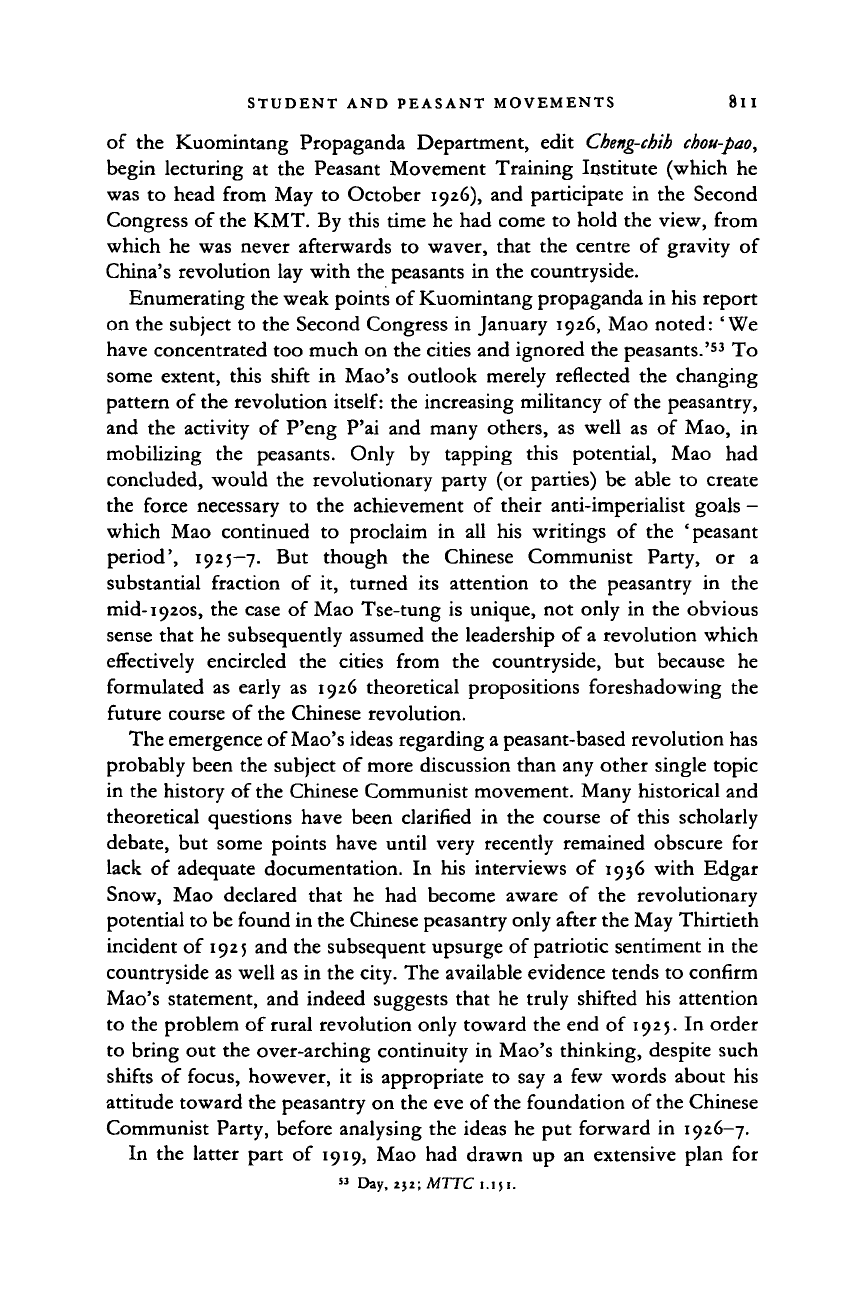
STUDENT AND PEASANT MOVEMENTS 8ll
of the Kuomintang Propaganda Department, edit
Cheng-chih
cbou-pao,
begin lecturing
at
the Peasant Movement Training Institute (which
he
was to head from May to October 1926), and participate
in
the Second
Congress of the KMT. By this time he had come to hold the view, from
which he was never afterwards
to
waver, that the centre
of
gravity
of
China's revolution lay with the peasants in the countryside.
Enumerating the weak points of Kuomintang propaganda in his report
on the subject to the Second Congress in January 1926, Mao noted: 'We
have concentrated too much on the cities and ignored the peasants.'
53
To
some extent, this shift
in
Mao's outlook merely reflected the changing
pattern of the revolution
itself:
the increasing militancy of the peasantry,
and the activity
of
P'eng P'ai and many others, as well as
of
Mao,
in
mobilizing
the
peasants. Only
by
tapping this potential, Mao
had
concluded, would the revolutionary party (or parties) be able
to
create
the force necessary
to
the achievement
of
their anti-imperialist goals
-
which Mao continued
to
proclaim
in all
his writings
of
the 'peasant
period', 1925-7.
But
though
the
Chinese Communist Party,
or a
substantial fraction
of
it, turned
its
attention
to
the peasantry
in the
mid-1920s, the case of Mao Tse-tung is unique, not only in the obvious
sense that he subsequently assumed the leadership of a revolution which
effectively encircled
the
cities from
the
countryside,
but
because
he
formulated as early as 1926 theoretical propositions foreshadowing the
future course of the Chinese revolution.
The emergence of Mao's ideas regarding a peasant-based revolution has
probably been the subject of more discussion than any other single topic
in the history of the Chinese Communist movement. Many historical and
theoretical questions have been clarified
in
the course
of
this scholarly
debate, but some points have until very recently remained obscure
for
lack
of
adequate documentation.
In
his interviews
of
1936 with Edgar
Snow, Mao declared that
he
had become aware
of
the revolutionary
potential to be found in the Chinese peasantry only after the May Thirtieth
incident of 1925 and the subsequent upsurge of patriotic sentiment in the
countryside as well as in the city. The available evidence tends to confirm
Mao's statement, and indeed suggests that he truly shifted his attention
to the problem of rural revolution only toward the end
of
1925. In order
to bring out the over-arching continuity in Mao's thinking, despite such
shifts of focus, however,
it
is appropriate to say
a
few words about his
attitude toward the peasantry on the eve of the foundation of the Chinese
Communist Party, before analysing the ideas he put forward in 1926—7.
In the latter part
of
1919, Mao had drawn up an extensive plan
for
»
Day, 252;
MTTC
I.IJI.
Cambridge Histories Online © Cambridge University Press, 2008
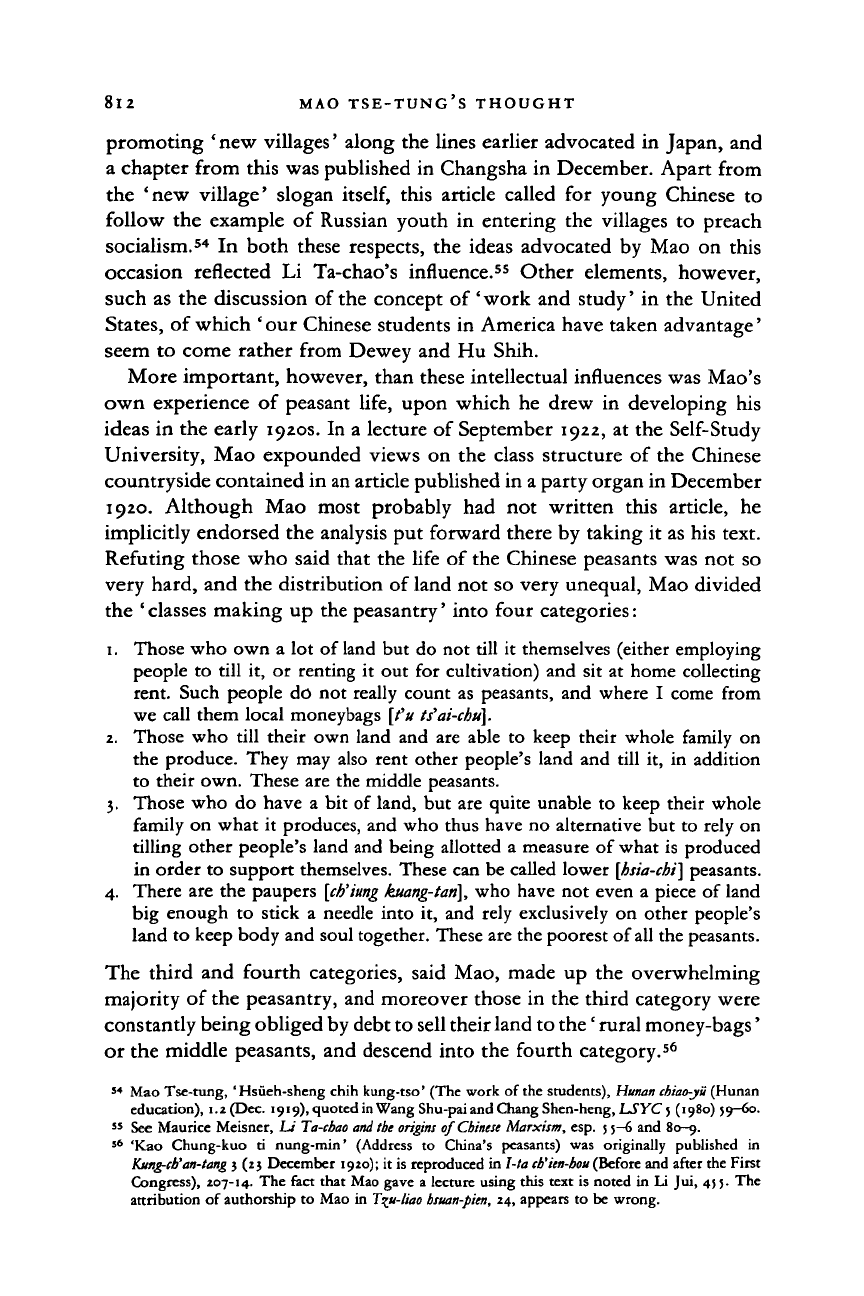
8l2 MAO TSE-TUNG'S THOUGHT
promoting ' new villages' along the lines earlier advocated in Japan, and
a chapter from this was published in Changsha in December. Apart from
the 'new village' slogan
itself,
this article called
for
young Chinese
to
follow the example
of
Russian youth
in
entering the villages
to
preach
socialism.
54
In
both these respects, the ideas advocated by Mao
on
this
occasion reflected
Li
Ta-chao's influence.
55
Other elements, however,
such as the discussion of the concept
of
'
work and study' in the United
States, of which ' our Chinese students in America have taken advantage'
seem to come rather from Dewey and Hu Shih.
More important, however, than these intellectual influences was Mao's
own experience
of
peasant life, upon which he drew
in
developing
his
ideas in the early 1920s. In
a
lecture of September 1922, at the Self-Study
University, Mao expounded views on the class structure
of
the Chinese
countryside contained in an article published in a party organ in December
1920.
Although Mao most probably
had not
written this article,
he
implicitly endorsed the analysis put forward there by taking
it
as his text.
Refuting those who said that the life of the Chinese peasants was not
so
very hard, and the distribution of land not so very unequal, Mao divided
the ' classes making up the peasantry' into four categories:
1.
Those who own a lot of land but do not till
it
themselves (either employing
people to till it,
or
renting
it
out for cultivation) and sit at home collecting
rent. Such people do not really count as peasants, and where
I
come from
we call them local moneybags \fu
ts'ai-cbu].
2.
Those who till their own land and are able
to
keep their whole family on
the produce. They may also rent other people's land and till it, in addition
to their own. These are the middle peasants.
3.
Those who do have a bit of land, but are quite unable to keep their whole
family on what it produces, and who thus have no alternative but to rely on
tilling other people's land and being allotted a measure of what is produced
in order to support themselves. These can be called lower
[hsia-chi\
peasants.
4.
There are the paupers
[ch'iung
kuang-tan],
who have not even a piece of land
big enough
to
stick
a
needle into it, and rely exclusively on other people's
land to keep body and soul together. These are the poorest of all the peasants.
The third and fourth categories, said Mao, made
up
the overwhelming
majority of the peasantry, and moreover those in the third category were
constantly being obliged by debt to sell their land to the' rural money-bags'
or the middle peasants, and descend into the fourth category.
56
54
Mao Tse-tung,
'
Hsiieh-sheng chih kung-tso' (The work
of
the students), Hunan cbiao-jii (Hunan
education), i.2(Dec. 1919), quoted in Wang Shu-pai and Chang Shen-heng, UYC
5
(1980) 59-60.
55
See
Maurice Meisner,
LJ
Ta-cbao and the origins
of
Chinese
Marxism, esp. 55-6
and
80-9.
56
'Kao
Chung-kuo
ti
nung-min' (Address
to
China's peasants)
was
originally published
in
Yiung-cb'an-tang 3 (23 December 1920);
it is
reproduced
in
1-ta cb'ien-bou (Before and after the First
Congress), 207-14.
The
fact that Mao gave
a
lecture using this text
is
noted
in Li
Jui, 455.
The
attribution
of
authorship
to
Mao
in
T^u-liao
bsuan-pien, 24, appears
to be
wrong.
Cambridge Histories Online © Cambridge University Press, 2008
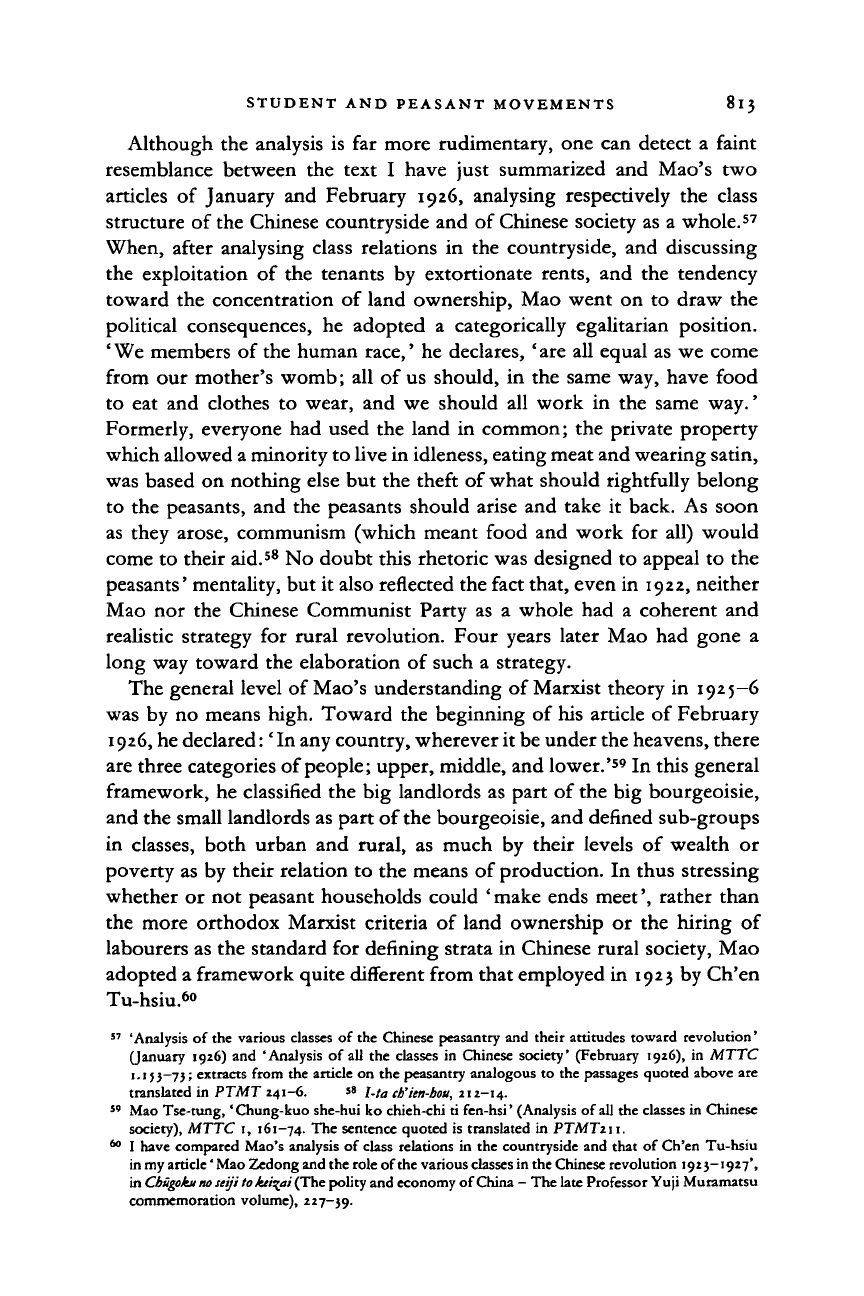
STUDENT AND PEASANT MOVEMENTS 813
Although
the
analysis
is far
more rudimentary,
one can
detect
a
faint
resemblance between
the
text
I
have just summarized
and
Mao's
two
articles
of
January
and
February
1926,
analysing respectively
the
class
structure
of
the Chinese countryside
and of
Chinese society
as a
whole.
S7
When, after analysing class relations
in
the
countryside,
and
discussing
the exploitation
of
the
tenants
by
extortionate rents,
and the
tendency
toward
the
concentration
of
land ownership,
Mao
went
on to
draw
the
political consequences,
he
adopted
a
categorically egalitarian position.
'
We
members
of
the human race,'
he
declares, '
are
all
equal
as we
come
from
our
mother's womb;
all of us
should,
in the
same way, have food
to
eat and
clothes
to
wear,
and we
should
all
work
in
the
same
way.'
Formerly, everyone
had
used
the
land
in
common;
the
private property
which allowed a minority
to
live
in
idleness, eating meat and wearing satin,
was based
on
nothing else
but the
theft
of
what should rightfully belong
to
the
peasants,
and the
peasants should arise
and
take
it
back.
As
soon
as they arose, communism (which meant food
and
work
for all)
would
come
to
their aid.
58
No
doubt this rhetoric was designed
to
appeal
to the
peasants' mentality,
but it
also reflected the fact that, even
in
1922, neither
Mao
nor the
Chinese Communist Party
as
a
whole
had
a
coherent
and
realistic strategy
for
rural revolution. Four years later
Mao had
gone
a
long
way
toward
the
elaboration
of
such
a
strategy.
The general level
of
Mao's understanding
of
Marxist theory
in
1925—6
was
by no
means high. Toward
the
beginning
of
his article
of
February
1926,
he declared:
'In
any country, wherever
it
be under the heavens, there
are three categories of people; upper, middle, and lower.'
59
In
this general
framework,
he
classified
the big
landlords
as
part
of
the
big
bourgeoisie,
and the small landlords
as
part
of
the bourgeoisie,
and
defined sub-groups
in classes, both urban
and
rural,
as
much
by
their levels
of
wealth
or
poverty
as by
their relation
to the
means
of
production.
In
thus stressing
whether
or not
peasant households could
'
make ends meet', rather than
the more orthodox Marxist criteria
of
land ownership
or
the
hiring
of
labourers
as the
standard
for
defining strata
in
Chinese rural society,
Mao
adopted
a
framework quite different from that employed
in
1923
by
Ch'en
Tu-hsiu.
60
57
'Analysis
of
the various classes
of
the Chinese peasantry and their attitudes toward revolution'
(January 1926) and 'Analysis
of
all
the
classes
in
Chinese society' (February 1926),
in
MTTC
1.15
3-73;
extracts from the article on the peasantry analogous
to
the passages quoted above are
translated
in
PTMT 241-6.
»
8
l-ta
cb'ien-bou,
212-14.
55
Mao Tse-tung,' Chung-kuo she-hui ko chieh-chi
ti
fen-hsi' (Analysis
of
all the classes in Chinese
society), MTTC
1,
161-74. The sentence quoted
is
translated
in
PTMTm.
60
I
have compared Mao's analysis
of
class relations
in
the countryside and that
of
Ch'en Tu-hsiu
in my article' Mao Zedong and the role of the various classes in the Chinese revolution 1923-1927',
in
Cbugoku no seiji
to
kti^ai (The polity and economy of China
-
The late Professor Yuji Muramatsu
commemoration volume), 227-39.
Cambridge Histories Online © Cambridge University Press, 2008
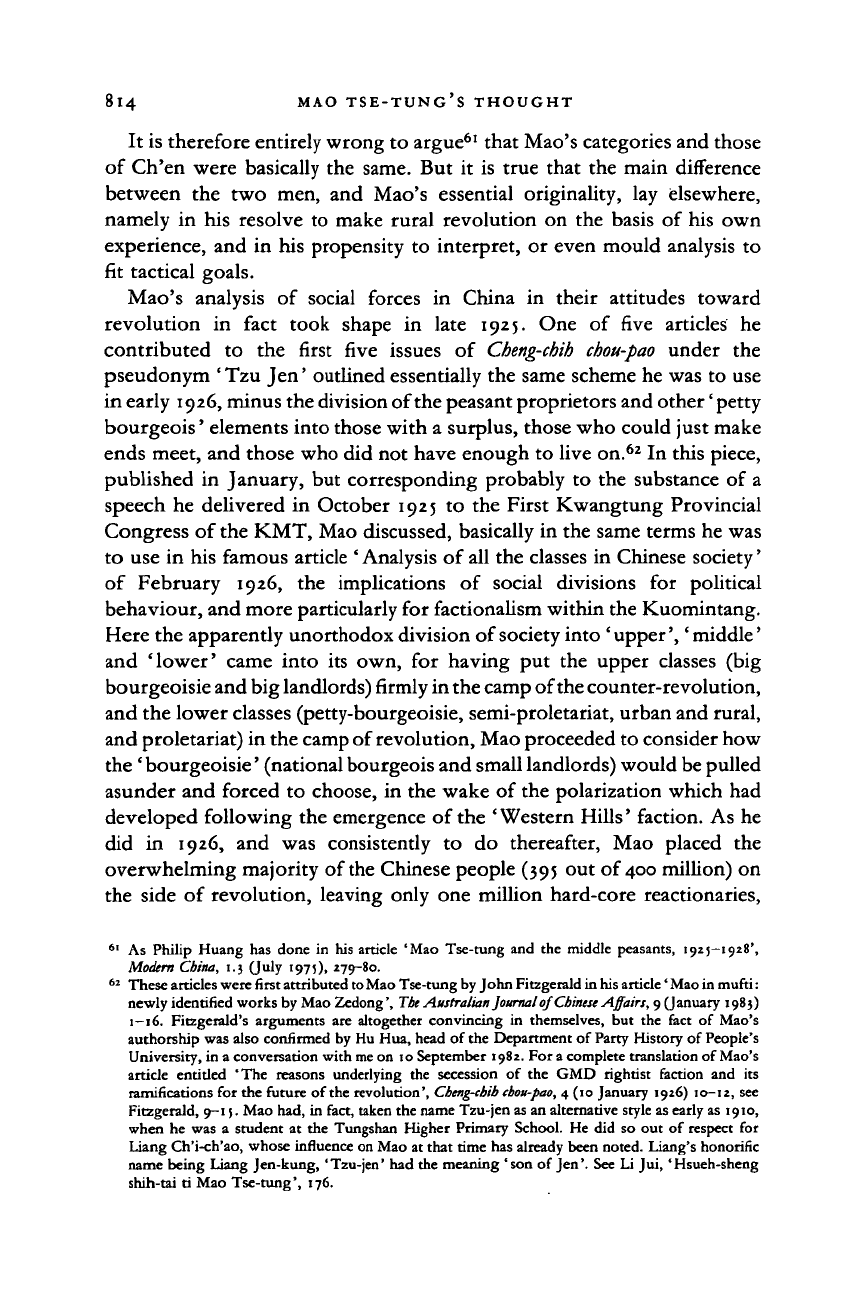
814 MAO TSE-TUNG'S THOUGHT
It is therefore entirely wrong to argue
61
that Mao's categories and those
of Ch'en were basically the same. But
it
is true that the main difference
between
the
two men, and Mao's essential originality,
lay
elsewhere,
namely
in
his resolve to make rural revolution on the basis
of
his own
experience, and in his propensity to interpret, or even mould analysis
to
fit
tactical goals.
Mao's analysis
of
social forces
in
China
in
their attitudes toward
revolution
in
fact took shape
in
late 1925.
One of
five articles
he
contributed
to the
first five issues
of
Cheng-chih chou-pao
under
the
pseudonym ' Tzu Jen' outlined essentially the same scheme he was to use
in early 1926, minus the division of the peasant proprietors and other' petty
bourgeois' elements into those with a surplus, those who could just make
ends meet, and those who did not have enough to live on.
62
In this piece,
published
in
January, but corresponding probably to the substance
of
a
speech he delivered in October 1925 to the First Kwangtung Provincial
Congress of the KMT, Mao discussed, basically in the same terms he was
to use in his famous article ' Analysis of all the classes in Chinese society'
of February 1926,
the
implications
of
social divisions
for
political
behaviour, and more particularly for factionalism within the Kuomintang.
Here the apparently unorthodox division of society into ' upper',' middle'
and 'lower' came into
its
own,
for
having
put
the upper classes (big
bourgeoisie and big landlords)
firmly
in the camp of the counter-revolution,
and the lower classes (petty-bourgeoisie, semi-proletariat, urban and rural,
and proletariat) in the camp of revolution, Mao proceeded to consider how
the'
bourgeoisie' (national bourgeois and small landlords) would be pulled
asunder and forced to choose, in the wake of the polarization which had
developed following the emergence of the ' Western Hills' faction. As he
did
in
1926,
and was
consistently
to do
thereafter, Mao placed
the
overwhelming majority of
the
Chinese people (395 out of 400 million) on
the side
of
revolution, leaving only one million hard-core reactionaries,
61
As
Philip Huang
has
done
in his
article
'Mao
Tse-tung
and the
middle peasants, 1925-1928',
Modern China,
1.3
(July 1975), 279-80.
62
These articles were first attributed to Mao Tse-tung by John Fitzgerald
in
his article' Mao in mufti:
newly identified works by Mao Zedong', The Australian journal of Chinese Affairs,
9
(January 1983)
1—16. Fitzgerald's arguments
are
altogether convincing
in
themselves,
but the
fact
of
Mao's
authorship was also confirmed
by Hu
Hua, head
of
the Department
of
Party History
of
People's
University,
in a
conversation with me
on
10 September 1982. For
a
complete translation
of
Mao's
article entitled
"The
reasons underlying
the
secession
of
the GMD
rightist faction
and
its
ramifications
for
the future
of
the revolution', Cheng-chib cbou-pao,
4
(10 January 1926) 10-12,
see
Fitzgerald, 9-15. Mao had,
in
fact, taken the name Tzu-jen as
an
alternative style as early as 1910,
when
he was
a
student
at the
Tungshan Higher Primary School.
He did so out of
respect
for
Liang Ch'i-ch'ao, whose influence
on
Mao
at
that time has already been noted. Liang's honorific
name being Liang Jen-kung, 'Tzu-jen'
had the
meaning 'son
of
Jen'. See
Li
Jui, 'Hsueh-sheng
shih-tai
ti
Mao Tse-tung',
176.
Cambridge Histories Online © Cambridge University Press, 2008
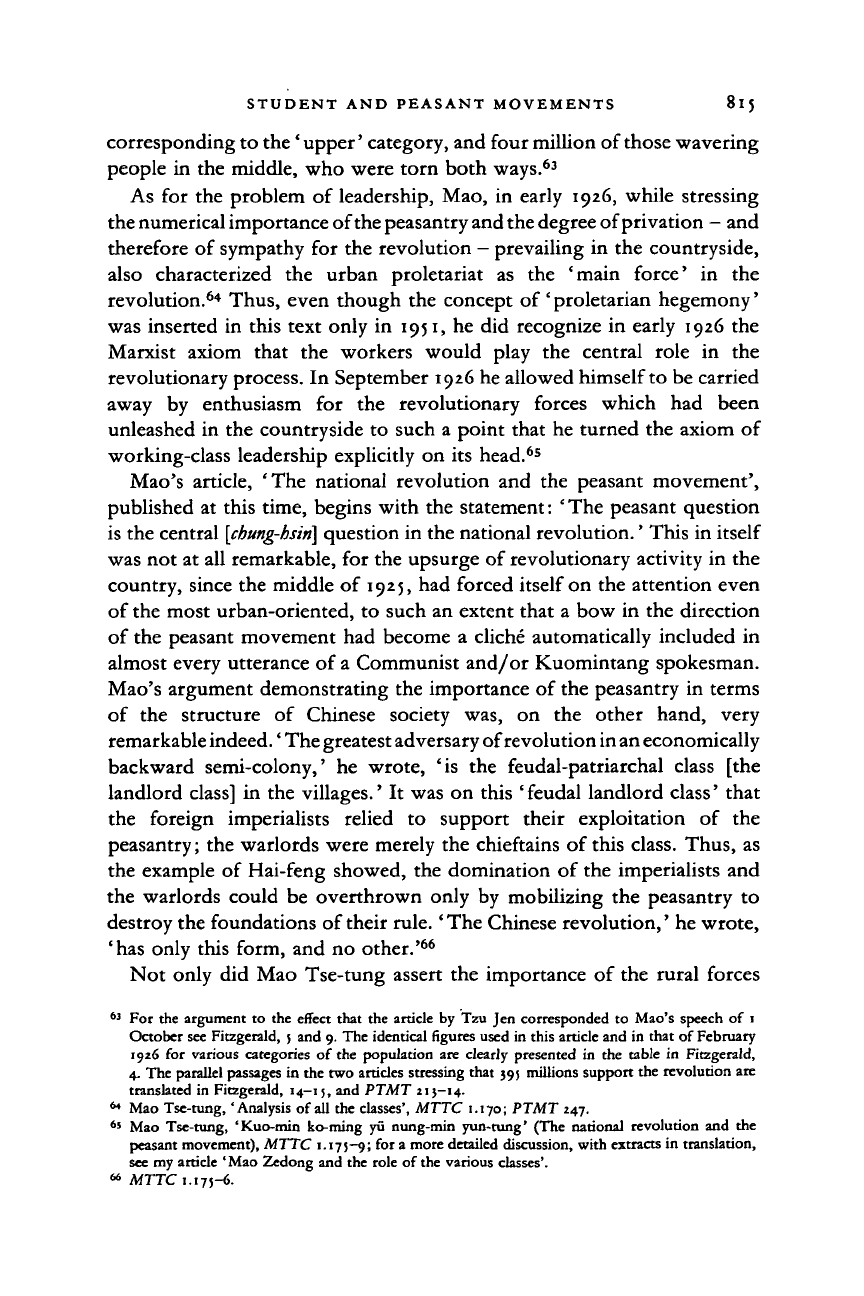
STUDENT AND PEASANT MOVEMENTS 815
corresponding to the 'upper' category, and four million of those wavering
people in the middle, who were torn both ways.
63
As for the problem of leadership, Mao, in early 1926, while stressing
the numerical importance of
the
peasantry and the degree of privation
—
and
therefore of sympathy for the revolution
—
prevailing in the countryside,
also characterized the urban proletariat as the 'main force' in the
revolution.
64
Thus, even though the concept of ' proletarian hegemony'
was inserted in this text only in 1951, he did recognize in early 1926 the
Marxist axiom that the workers would play the central role in the
revolutionary process. In September 1926 he allowed himself to be carried
away by enthusiasm for the revolutionary forces which had been
unleashed in the countryside to such a point that he turned the axiom of
working-class leadership explicitly on its head.
65
Mao's article, 'The national revolution and the peasant movement',
published at this time, begins with the statement: ' The peasant question
is the central
\chung-hsiri\
question in the national revolution.' This in itself
was not at all remarkable, for the upsurge of revolutionary activity in the
country, since the middle of 1925, had forced itself on the attention even
of the most urban-oriented, to such an extent that a bow in the direction
of the peasant movement had become a cliche automatically included in
almost every utterance of a Communist and/or Kuomintang spokesman.
Mao's argument demonstrating the importance of the peasantry in terms
of the structure of Chinese society was, on the other hand, very
remarkable indeed.' The greatest adversary of revolution in an economically
backward semi-colony,' he wrote, 'is the feudal-patriarchal class [the
landlord class] in the villages.' It was on this
'
feudal landlord class' that
the foreign imperialists relied to support their exploitation of the
peasantry; the warlords were merely the chieftains of this class. Thus, as
the example of Hai-feng showed, the domination of the imperialists and
the warlords could be overthrown only by mobilizing the peasantry to
destroy the foundations of their rule.' The Chinese revolution,' he wrote,
'has only this form, and no other.'
66
Not only did Mao Tse-tung assert the importance of the rural forces
63
For
the
argument
to the
effect that
the
article
by
Tzu Jen corresponded
to
Mao's speech
of i
October see Fitzgerald,
5
and
9.
The identical figures used
in
this article and
in
that
of
February
1926
for
various categories
of
the population
are
clearly presented
in the
table
in
Fitzgerald,
4.
The parallel passages
in
the two articles stressing that 395 millions support the revolution
are
translated
in
Fitzgerald, 14-15, and PTMT 213-14.
64
Mao Tse-tung, 'Analysis
of
all the classes', MTTC 1.170; PTMT 247.
65
Mao Tse-tung, 'Kuo-min ko-ming
yu
nung-min yun-tung' (The national revolution
and the
peasant movement), MTTC 1.175-9; for
a
more detailed discussion, with extracts
in
translation,
see my article 'Mao Zedong and the role
of
the various classes'.
66
MTTC 1.175-6.
Cambridge Histories Online © Cambridge University Press, 2008
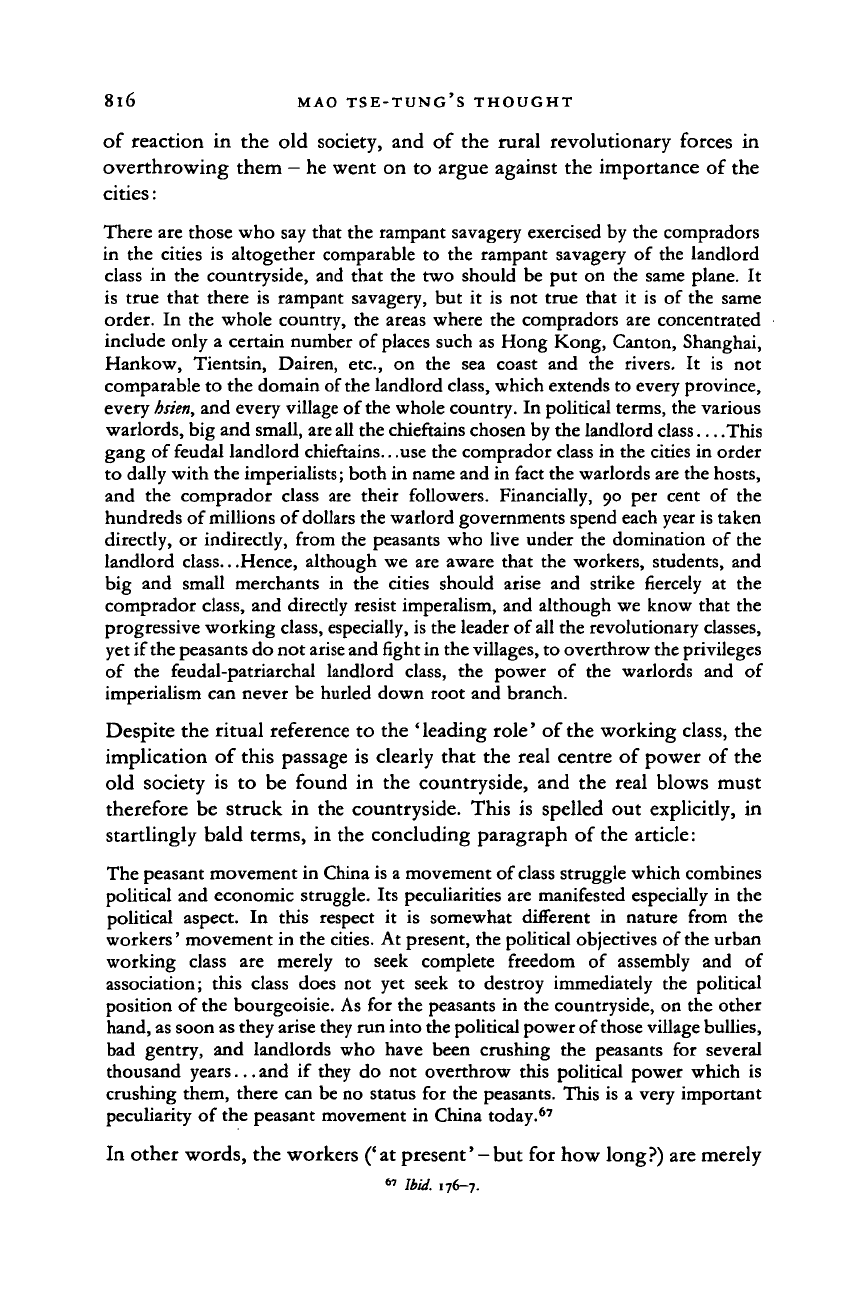
816 MAO TSE-TUNG'S THOUGHT
of reaction in the old society, and of the rural revolutionary forces in
overthrowing them
—
he went on to argue against the importance of the
cities:
There are those who say that the rampant savagery exercised by the compradors
in the cities is altogether comparable to the rampant savagery of the landlord
class in the countryside, and that the two should be put on the same plane. It
is true that there is rampant savagery, but it is not true that it is of the same
order. In the whole country, the areas where the compradors are concentrated
include only a certain number of places such as Hong Kong, Canton, Shanghai,
Hankow, Tientsin, Dairen, etc., on the sea coast and the rivers. It is not
comparable to the domain of
the
landlord class, which extends to every province,
every
hsien,
and every village of
the
whole country. In political terms, the various
warlords, big and small, are all the chieftains chosen by the landlord class This
gang of feudal landlord chieftains.. .use the comprador class in the cities in order
to dally with the imperialists; both in name and in fact the warlords are the hosts,
and the comprador class are their followers. Financially, 90 per cent of the
hundreds of millions of
dollars
the warlord governments spend each year is taken
directly, or indirectly, from the peasants who live under the domination of the
landlord
class..
.Hence, although we are aware that the workers, students, and
big and small merchants in the cities should arise and strike fiercely at the
comprador class, and directly resist imperalism, and although we know that the
progressive working class, especially, is the leader of
all
the revolutionary classes,
yet if the peasants do not arise and fight in the villages, to overthrow the privileges
of the feudal-patriarchal landlord class, the power of the warlords and of
imperialism can never be hurled down root and branch.
Despite the ritual reference to the ' leading role' of the working class, the
implication of this passage is clearly that the real centre of power of the
old society is to be found in the countryside, and the real blows must
therefore be struck in the countryside. This is spelled out explicitly, in
startlingly bald terms, in the concluding paragraph of the article:
The peasant movement in China is a movement of
class
struggle which combines
political and economic struggle. Its peculiarities are manifested especially in the
political aspect. In this respect it is somewhat different in nature from the
workers' movement in the cities. At present, the political objectives of
the
urban
working class are merely to seek complete freedom of assembly and of
association; this class does not yet seek to destroy immediately the political
position of the bourgeoisie. As for the peasants in the countryside, on the other
hand, as soon as they arise they run into the political power of those village bullies,
bad gentry, and landlords who have been crushing the peasants for several
thousand
years...
and if they do not overthrow this political power which is
crushing them, there can be no status for the peasants. This is a very important
peculiarity of the peasant movement in China today.
67
In other words, the workers ('at present' —but for how long?) are merely
«
Ibid.
176-7.
Cambridge Histories Online © Cambridge University Press, 2008
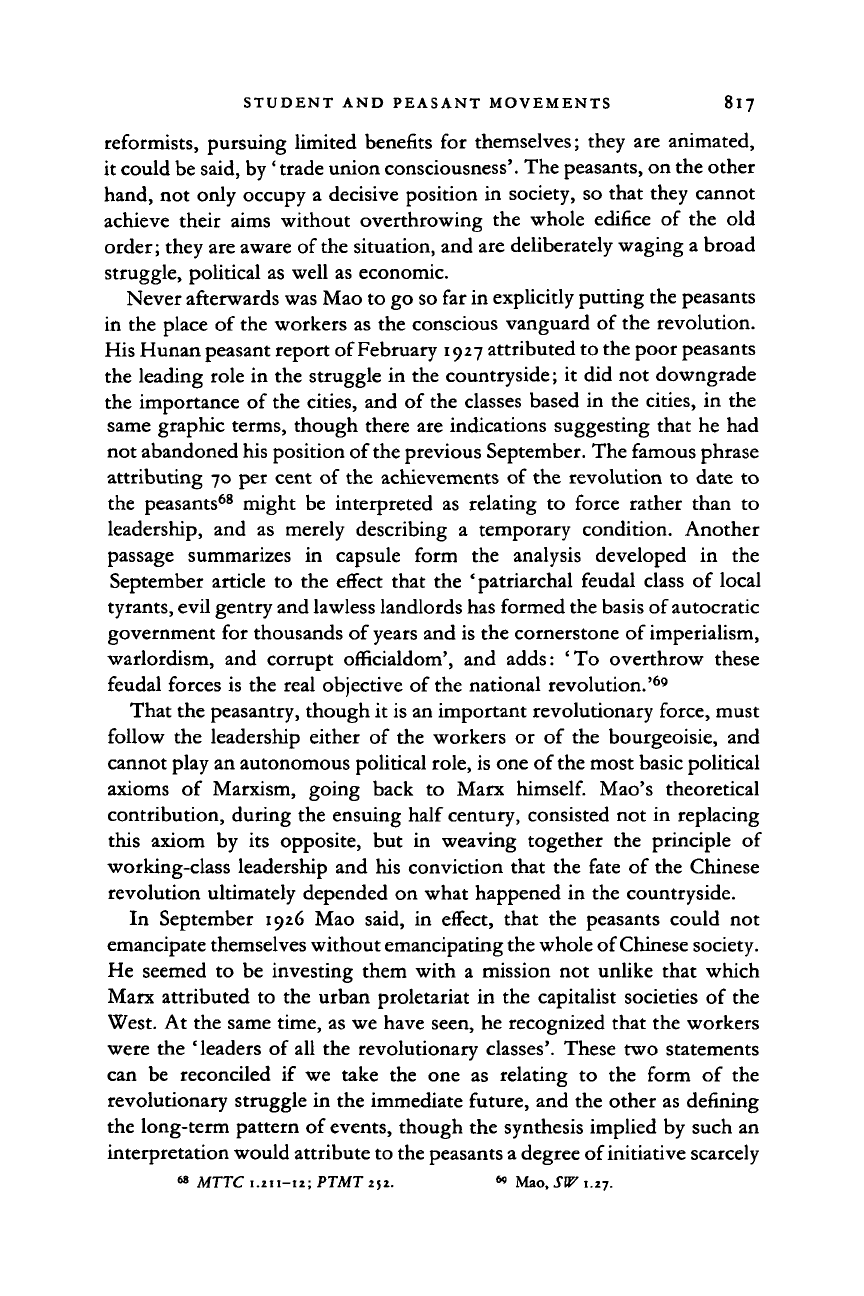
STUDENT AND PEASANT MOVEMENTS 817
reformists, pursuing limited benefits for themselves; they are animated,
it could be said, by' trade union consciousness'. The peasants, on the other
hand, not only occupy a decisive position in society, so that they cannot
achieve their aims without overthrowing the whole edifice of the old
order; they are aware of the situation, and are deliberately waging a broad
struggle, political as well as economic.
Never afterwards was Mao to go so far in explicitly putting the peasants
in the place of the workers as the conscious vanguard of the revolution.
His Hunan peasant report of February 1927 attributed to the poor peasants
the leading role in the struggle in the countryside; it did not downgrade
the importance of the cities, and of the classes based in the cities, in the
same graphic terms, though there are indications suggesting that he had
not abandoned his position of the previous September. The famous phrase
attributing 70 per cent of the achievements of the revolution to date to
the peasants
68
might be interpreted as relating to force rather than to
leadership, and as merely describing a temporary condition. Another
passage summarizes in capsule form the analysis developed in the
September article to the effect that the ' patriarchal feudal class of local
tyrants, evil gentry and lawless landlords has formed the basis of autocratic
government for thousands of years and is the cornerstone of imperialism,
warlordism, and corrupt officialdom', and adds: 'To overthrow these
feudal forces is the real objective of the national revolution.'
69
That the peasantry, though it is an important revolutionary force, must
follow the leadership either of the workers or of the bourgeoisie, and
cannot play an autonomous political role, is one of the most basic political
axioms of Marxism, going back to Marx
himself.
Mao's theoretical
contribution, during the ensuing half century, consisted not in replacing
this axiom by its opposite, but in weaving together the principle of
working-class leadership and his conviction that the fate of the Chinese
revolution ultimately depended on what happened in the countryside.
In September 1926 Mao said, in effect, that the peasants could not
emancipate themselves without emancipating the whole of Chinese society.
He seemed to be investing them with a mission not unlike that which
Marx attributed to the urban proletariat in the capitalist societies of the
West. At the same time, as we have seen, he recognized that the workers
were the 'leaders of all the revolutionary classes'. These two statements
can be reconciled if we take the one as relating to the form of the
revolutionary struggle in the immediate future, and the other as defining
the long-term pattern of events, though the synthesis implied by such an
interpretation would attribute to the peasants a degree of initiative scarcely
68
MTTC 1.211-12; PTMT 252. « Mao, SW 1.27.
Cambridge Histories Online © Cambridge University Press, 2008
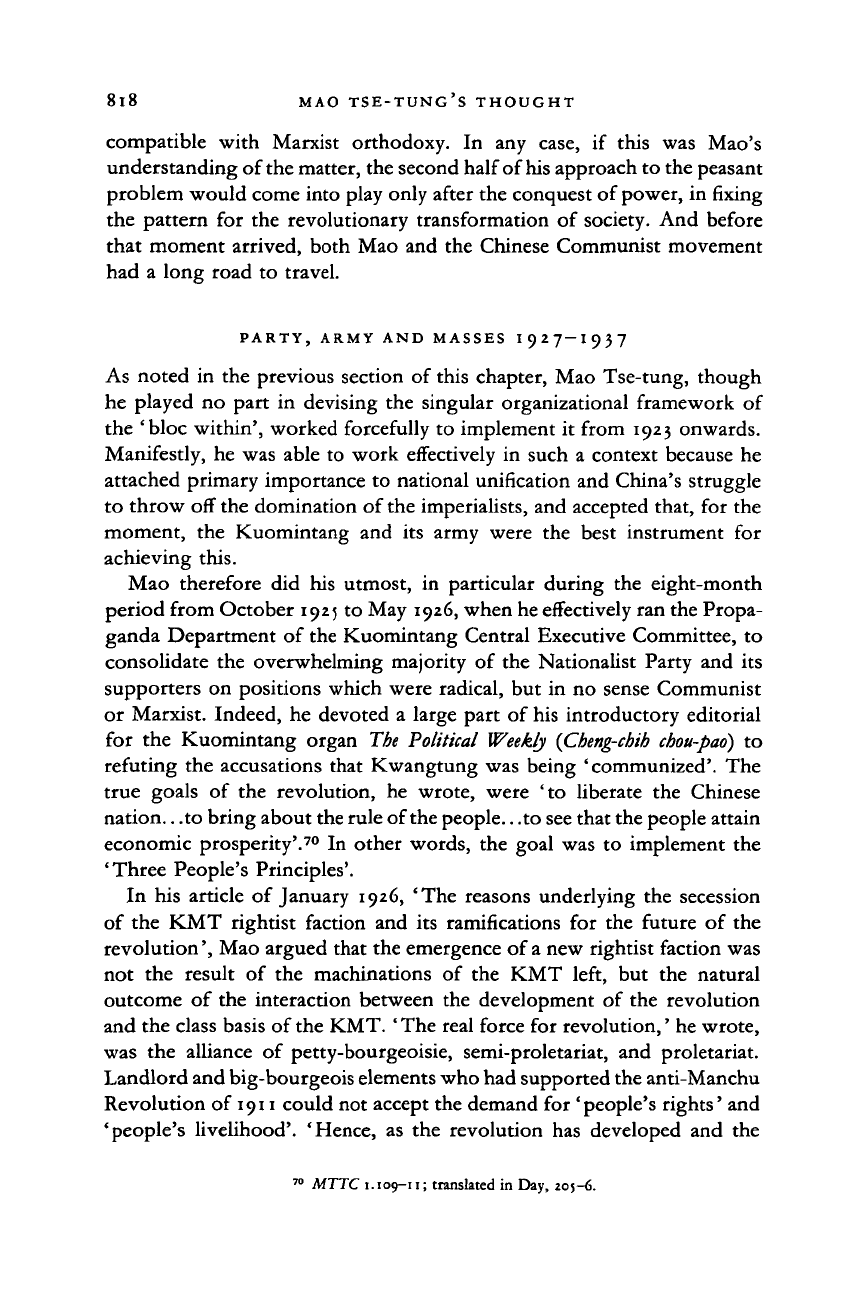
818 MAO TSE-TUNG'S THOUGHT
compatible with Marxist orthodoxy. In any case, if this was Mao's
understanding of the matter, the second half of his approach to the peasant
problem would come into play only after the conquest of power, in fixing
the pattern for the revolutionary transformation of society. And before
that moment arrived, both Mao and the Chinese Communist movement
had a long road to travel.
PARTY, ARMY AND MASSES I927-I937
As noted in the previous section of this chapter, Mao Tse-tung, though
he played no part in devising the singular organizational framework of
the 'bloc within', worked forcefully to implement it from 1923 onwards.
Manifestly, he was able to work effectively in such a context because he
attached primary importance to national unification and China's struggle
to throw off the domination of the imperialists, and accepted that, for the
moment, the Kuomintang and its army were the best instrument for
achieving this.
Mao therefore did his utmost, in particular during the eight-month
period from October 1925 to May 1926, when he effectively ran the Propa-
ganda Department of the Kuomintang Central Executive Committee, to
consolidate the overwhelming majority of the Nationalist Party and its
supporters on positions which were radical, but in no sense Communist
or Marxist. Indeed, he devoted a large part of his introductory editorial
for the Kuomintang organ The Political Weekly
{Cheng-chih cbou-pao)
to
refuting the accusations that Kwangtung was being 'communized'. The
true goals of the revolution, he wrote, were 'to liberate the Chinese
nation.. .to bring about the rule of the people.. .to see that the people attain
economic prosperity'.
70
In other words, the goal was to implement the
'Three People's Principles'.
In his article of January 1926, 'The reasons underlying the secession
of the KMT rightist faction and its ramifications for the future of the
revolution', Mao argued that the emergence of
a
new rightist faction was
not the result of the machinations of the KMT left, but the natural
outcome of the interaction between the development of the revolution
and the class basis of the KMT. ' The real force for revolution,' he wrote,
was the alliance of petty-bourgeoisie, semi-proletariat, and proletariat.
Landlord and big-bourgeois elements who had supported the anti-Manchu
Revolution of
1911
could not accept the demand for 'people's rights' and
'people's livelihood'. 'Hence, as the revolution has developed and the
70
MTTC 1.109-11; translated in Day, 205-6.
Cambridge Histories Online © Cambridge University Press, 2008
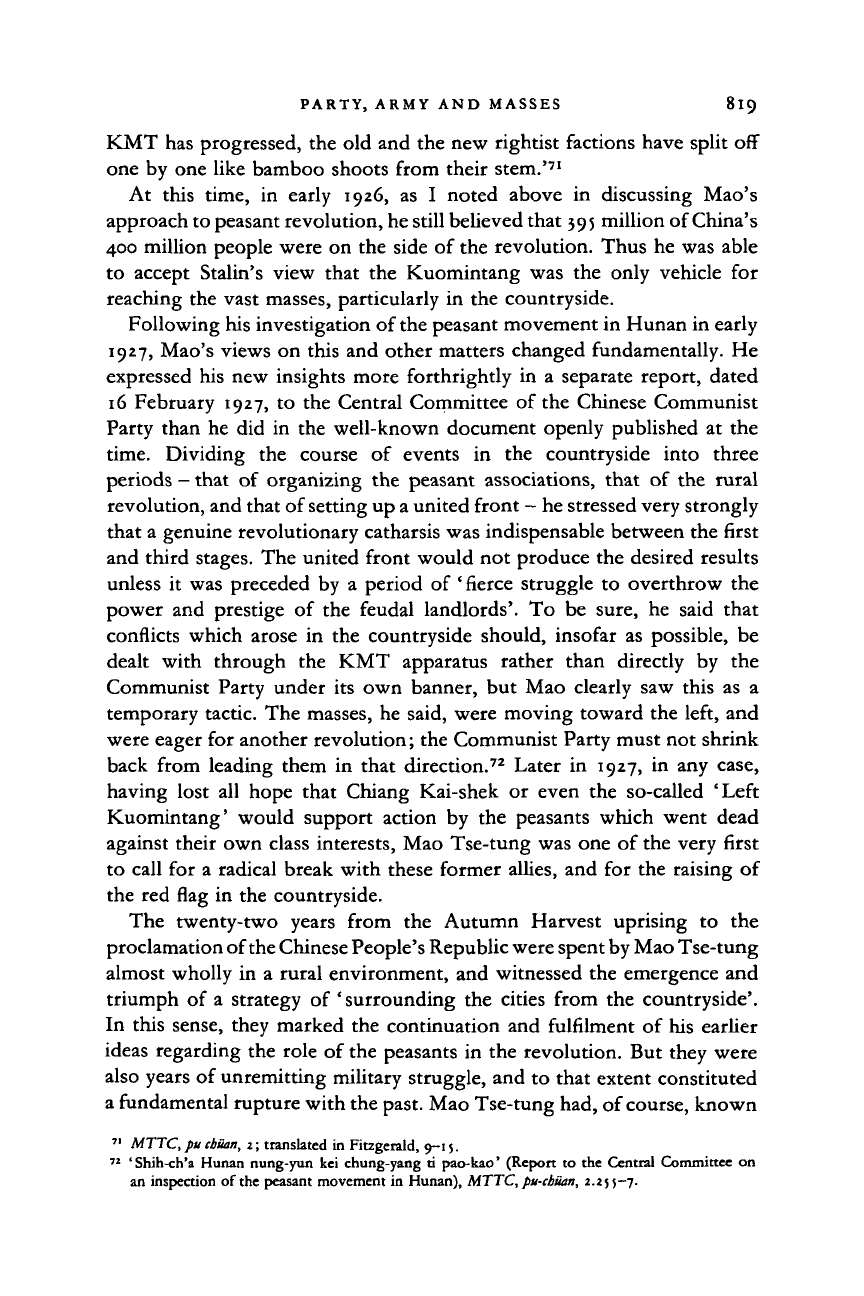
PARTY, ARMY AND MASSES 819
KMT has progressed, the old and the new rightist factions have split off
one by one like bamboo shoots from their stem.'
71
At this time, in early 1926, as I noted above in discussing Mao's
approach to peasant revolution, he still believed that 395 million of China's
400 million people were on the side of the revolution. Thus he was able
to accept Stalin's view that the Kuomintang was the only vehicle for
reaching the vast masses, particularly in the countryside.
Following his investigation of the peasant movement in Hunan in early
1927,
Mao's views on this and other matters changed fundamentally. He
expressed his new insights more forthrightly in a separate report, dated
16 February 1927, to the Central Committee of the Chinese Communist
Party than he did in the well-known document openly published at the
time.
Dividing the course of events in the countryside into three
periods
—
that of organizing the peasant associations, that of the rural
revolution, and that of setting up a united front
—
he stressed very strongly
that a genuine revolutionary catharsis was indispensable between the first
and third stages. The united front would not produce the desired results
unless it was preceded by a period of 'fierce struggle to overthrow the
power and prestige of the feudal landlords'. To be sure, he said that
conflicts which arose in the countryside should, insofar as possible, be
dealt with through the KMT apparatus rather than directly by the
Communist Party under its own banner, but Mao clearly saw this as a
temporary tactic. The masses, he said, were moving toward the left, and
were eager for another revolution; the Communist Party must not shrink
back from leading them in that direction.
72
Later in 1927, in any case,
having lost all hope that Chiang Kai-shek or even the so-called 'Left
Kuomintang' would support action by the peasants which went dead
against their own class interests, Mao Tse-tung was one of the very first
to call for a radical break with these former allies, and for the raising of
the red flag in the countryside.
The twenty-two years from the Autumn Harvest uprising to the
proclamation of the Chinese People's Republic
were
spent by Mao Tse-tung
almost wholly in a rural environment, and witnessed the emergence and
triumph of a strategy of 'surrounding the cities from the countryside'.
In this sense, they marked the continuation and fulfilment of his earlier
ideas regarding the role of the peasants in the revolution. But they were
also years of unremitting military struggle, and to that extent constituted
a fundamental rupture with the past. Mao Tse-tung had, of course, known
71
MTTC,
pu
cbuan,
2;
translated
in
Fitzgerald, 9-15.
72
'Shih-ch'a Hunan nung-yun
kei
chung-yang
ti
pao-kao' (Report
to the
Central Committee
on
an inspection
of
the peasant movement
in
Hunan), MTTC, pu-cbuan, 2.255-7.
Cambridge Histories Online © Cambridge University Press, 2008
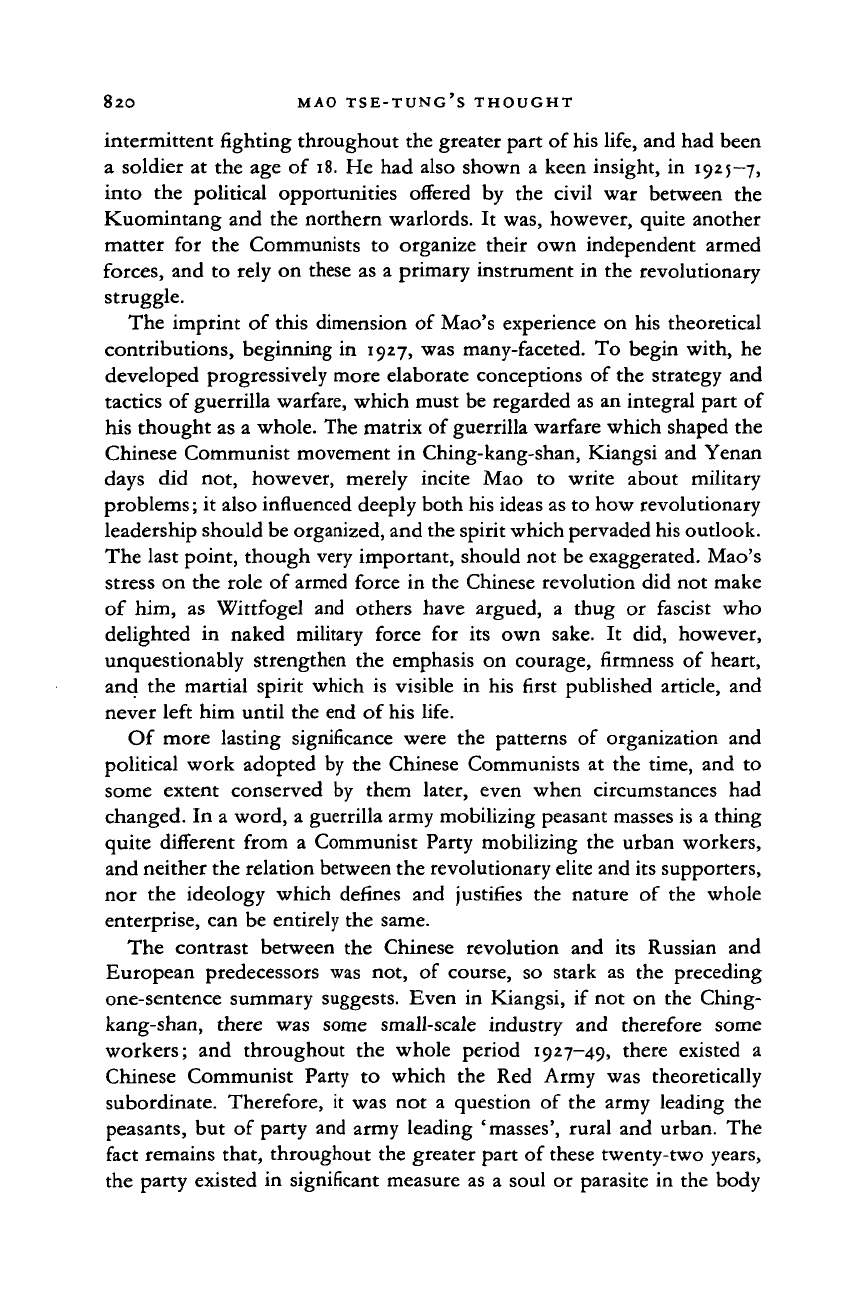
820 MAO TSE-TUNG'S THOUGHT
intermittent fighting throughout the greater part of his life, and had been
a soldier at the age of 18. He had also shown a keen insight, in 1925-7,
into the political opportunities offered by the civil war between the
Kuomintang and the northern warlords. It was, however, quite another
matter for the Communists to organize their own independent armed
forces, and to rely on these as a primary instrument in the revolutionary
struggle.
The imprint of this dimension of Mao's experience on his theoretical
contributions, beginning in 1927, was many-faceted. To begin with, he
developed progressively more elaborate conceptions of the strategy and
tactics of guerrilla warfare, which must be regarded as an integral part of
his thought as a whole. The matrix of guerrilla warfare which shaped the
Chinese Communist movement in Ching-kang-shan, Kiangsi and Yenan
days did not, however, merely incite Mao to write about military
problems; it also influenced deeply both his ideas as to how revolutionary
leadership should be organized, and the spirit which pervaded his outlook.
The last point, though very important, should not be exaggerated. Mao's
stress on the role of armed force in the Chinese revolution did not make
of him, as Wittfogel and others have argued, a thug or fascist who
delighted in naked military force for its own sake. It did, however,
unquestionably strengthen the emphasis on courage, firmness of heart,
and the martial spirit which is visible in his first published article, and
never left him until the end of his life.
Of more lasting significance were the patterns of organization and
political work adopted by the Chinese Communists at the time, and to
some extent conserved by them later, even when circumstances had
changed. In a word, a guerrilla army mobilizing peasant masses is a thing
quite different from a Communist Party mobilizing the urban workers,
and neither the relation between the revolutionary elite and its supporters,
nor the ideology which defines and justifies the nature of the whole
enterprise, can be entirely the same.
The contrast between the Chinese revolution and its Russian and
European predecessors was not, of course, so stark as the preceding
one-sentence summary suggests. Even in Kiangsi, if not on the Ching-
kang-shan, there was some small-scale industry and therefore some
workers; and throughout the whole period 1927—49, there existed a
Chinese Communist Party to which the Red Army was theoretically
subordinate. Therefore, it was not a question of the army leading the
peasants, but of party and army leading 'masses', rural and urban. The
fact remains that, throughout the greater part of these twenty-two years,
the party existed in significant measure as a soul or parasite in the body
Cambridge Histories Online © Cambridge University Press, 2008
